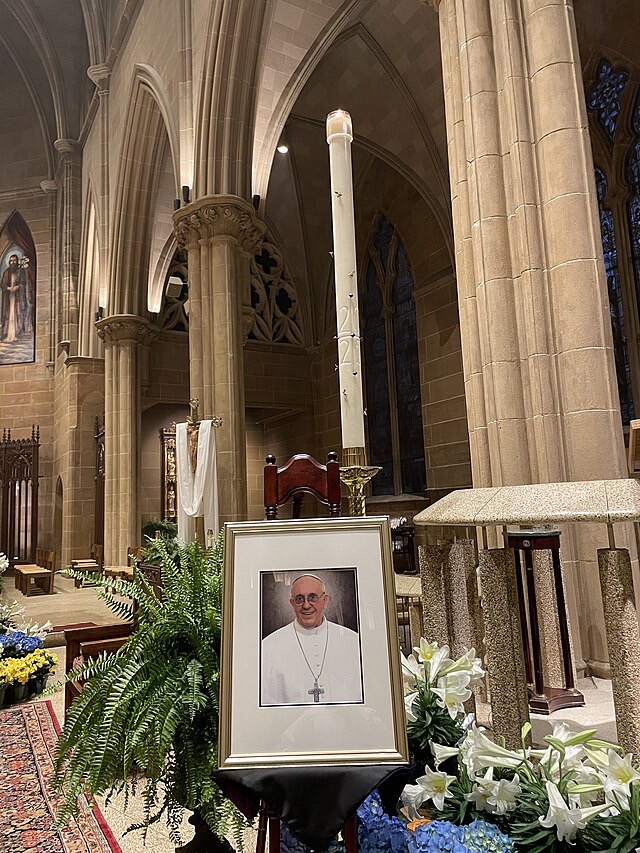As thousands gathered in St. Peter’s Square under the gray Roman sky, the world said goodbye to Pope Francis in a ceremony marked by deep emotion and ancient tradition. But amidst the prayers and tears, a jarring sight disrupted the solemnity: several world leaders were caught on camera raising their smartphones to capture photos and videos of the late pontiff’s humble wooden coffin. Their actions have since ignited a fierce backlash, raising urgent questions about respect, decorum, and the pervasive grip of technology even at humanity’s most sacred moments.
The Funeral Scene at St. Peter’s Basilica
A Historic Farewell to Pope Francis
Pope Francis’ funeral was one for the history books. A man who spent his life advocating for the poor, the marginalized, and the forgotten, Francis had insisted on a simple ceremony and an unadorned wooden coffin, a stark contrast to the ornate traditions of past papal funerals.
Pilgrims, world leaders, clergy, and the faithful filled St. Peter’s Basilica and the sprawling square beyond, their heads bowed in prayer. The air was thick with incense and sorrow as hymns echoed against the centuries-old marble. Cardinals in crimson and white stood solemnly by the casket, their hands clasped in reverence, as the final rites were performed.
The event was broadcast live across the globe, allowing millions to participate in a farewell that transcended borders and beliefs.
The Somber Mood Among Global Dignitaries
Among the first rows sat the most powerful and influential figures on the planet—presidents, prime ministers, and royalty. Draped in black, they represented the gravity of the moment, symbolizing a world united, if briefly, in mourning.
For most of the ceremony, the mood remained deeply respectful. Heads were bowed, hands clasped, and tears were openly shed. It was a rare display of vulnerability from those who usually carry the weight of their nations on their shoulders.
But as the casket began its slow, somber return to the Basilica, something happened that broke the spell.
Leaders Pulled Out Phones Despite Sacred Moment
Trump, Macron, and Stubb Caught on Camera
As the casket moved, several high-profile figures—including U.S. President Donald Trump, French President Emmanuel Macron, and Finland’s President Alexander Stubb—were seen lifting their smartphones.
Captured in broadcast footage and countless photographs, the leaders appeared more like eager tourists than mourners at a state funeral. Trump, ever conspicuous, adjusted his phone for a better angle, while Macron and Stubb seemed to quickly snap a few frames.
The scene was jarring: amidst solemn applause and bowed heads, gleaming phones were suddenly thrust into the air.
Phones in the Air: A Startling Sight at a Solemn Ceremony
In an era where snapping a photo has become an almost involuntary reflex, the image of world leaders recording a funeral still struck a deep nerve.
This wasn’t a concert, a summit, or a parade. This was the final farewell to a man who symbolized humility, simplicity, and devotion to others. And yet, in that sacred space, the impulse to document overruled the impulse to simply be present.
For many viewers around the world, the visual felt like a profound betrayal of the moment’s solemnity.
Immediate Public Backlash
Social Media Outrage
Social media reacted with predictable—and fierce—outrage.
Images of Trump, Macron, and Stubb went viral within minutes. Commentators flooded Twitter, Instagram, and TikTok with condemnations ranging from scathing to sorrowful. Hashtags like #NoRespect, #PutThePhoneAway, and #FuneralFail quickly climbed trending charts.
One viral post read: “You’re not at Disneyland. You’re at the funeral of a pope. Act like it.”
Another added: “Pope Francis lived a life of humility. They couldn’t put their phones away for one hour in his honor?”
In a world increasingly frustrated with leaders who seem detached from ordinary human decency, the moment resonated painfully.
News Outlets Highlight Leaders’ Faux Pas
Major global news outlets soon picked up the story.
Leading headlines across the world read:
- “World Leaders Disrespect Solemnity at Pope’s Funeral”
- “Phones Over Reverence: The Moment That Shamed Diplomacy”
- “Screens Up, Heads Down: A Sobering Image from St. Peter’s”
Opinion pieces quickly followed, questioning not just the leaders’ judgment but the broader cultural shift towards constant documentation—even during life’s most sacred rituals.
Breaking Down the Disrespect
Why Phones at Funerals Hit a Nerve
Funerals, across nearly every culture and faith tradition, are sacred moments of respect, grief, and remembrance. They demand a rare form of presence—one that technology often undermines.
Seeing world leaders treating Pope Francis’ funeral as a photo opportunity rather than a moment of genuine mourning felt, to many, like a grotesque prioritization of appearances over authenticity.
Especially given Pope Francis’ lifelong advocacy for simplicity and sincerity, the contrast couldn’t have been sharper—or more heartbreaking.
Comparing This to Past Public Mourning Traditions
Historically, mourning at state funerals is marked by strict decorum.
From Abraham Lincoln’s funeral procession to Winston Churchill’s state funeral, public figures have understood that their behavior in these moments reflects not only their personal respect but their nation’s dignity.
The advent of smartphones has undeniably blurred these lines. Still, at an event of such magnitude and meaning, many believe that leaders should set an example—by living in the moment, not documenting it.



